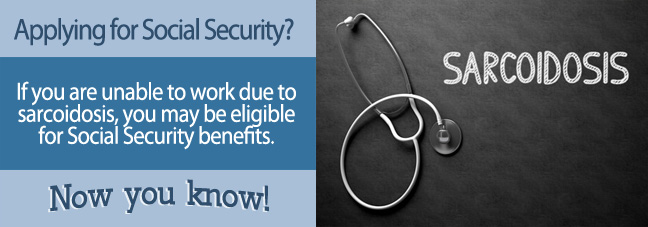The pain and acute fatigue triggered by sarcoidosis has prevented you from working. Between lost income and rapidly rising medical bills, you submitted an application for Social Security Disability Insurance (SSDI) to provide financial relief.
Unfortunately, the Social Security Administration (SSA) did not find the symptoms you listed in the SSDI application to be worthy of financial assistance. All is not lost, as the SSA allows claimants that had an SSDI application denied to request an appeal hearing with an administrative law judge (ALJ).
What to Expect at an ALJ Hearing
An ALJ hearing gives you a better chance of having your SSDI application approved. Although the SSA denies 66 percent of SSDI applications, claimants that file appeals win nearly 50 percent of the time. Yes, you should request an ALJ hearing if the SSA denied your SSDI application.
With your request, make sure to include a legal brief that clearly describes the circumstances surrounding the diagnosis of sarcoidosis. The legal brief provides the judge with the information he or she needs to ask the right questions during the ALJ hearing. You should answer the questions in a truthful manner by not embellishing on any of the sarcoidosis symptoms that inhibit your job performance.
Unlike a criminal court proceeding, an ALJ hearing is not an adversarial affair. This means you should not take any of the questions asked by the judge personally. If you get defensive when answering the judge’s question, your appeal might be denied.
Be prepared to discuss all the limitations sarcoidosis has placed on you in the workplace. You should submit documentation from your employer that verifies your testimony. Even better, ask your employer to attend the ALJ hearing to answer questions posed by your disability lawyer. A Social Security disability attorney acts as the legal advocate on your behalf.

How to Present the Most Convincing Appeal
The first tip for winning an ALJ appeal is to hire a state licensed disability attorney. You lawyer should put you through question and answer sessions to prepare you to handle the questions asked by the judge at the ALJ hearing.
Make sure to answer the questions truthfully, as well as clearly describe how sarcoidosis has prevented you from earning a living. Expect the judge to use the SSA Blue Book to determine whether your sarcoidosis symptoms meet the litmus test for severity.
Arrive to the ALJ hearing at least 30 minutes before it begins. The judge overseeing your case has the legal power to dismiss your SSDI claim if you show up late to the hearing.
In addition, arriving early allows you and your disability lawyer to make any last minute changes to your testimony. The extra time also gives your attorney time to prepare expert witnesses from the medical community, as well as witnesses that represent your employer.
Work with a Highly Rated Disability Lawyer
Experienced disability lawyers have a thorough understanding about what it takes to win an appeal for a denied SSDI application. Hiring an accomplished lawyer to represent you during an ALJ hearing removes the responsibility of making your case from your shoulders.
Your attorney interacts with the judge, as well as handles every legal maneuver that bolsters your claim. After filing the request for an ALJ hearing, your attorney monitors the progress of the request by contacting the appropriate court personnel.
Schedule a free case evaluation with a disability lawyer to determine how you can convince the judge to approve your SSDI application.